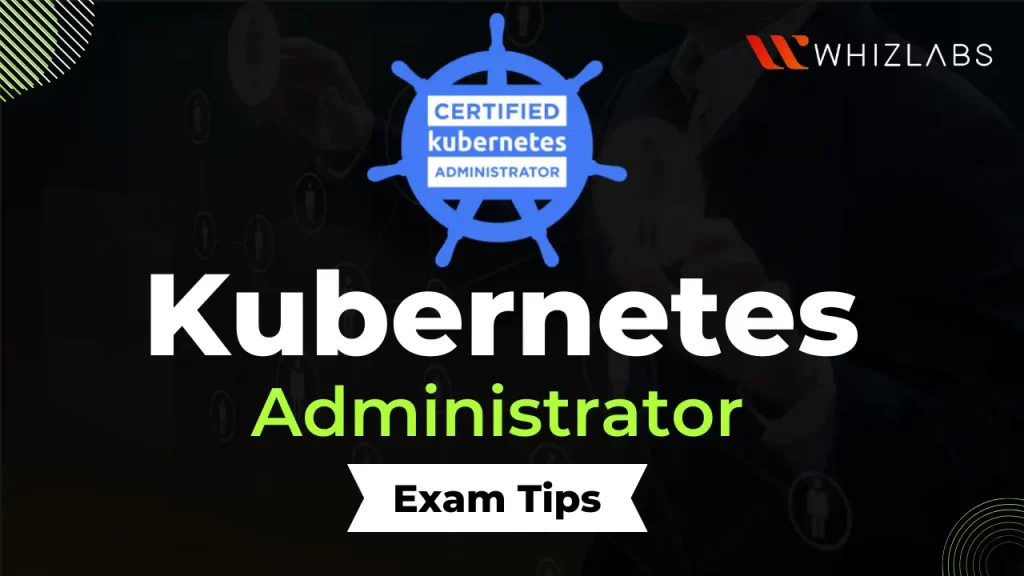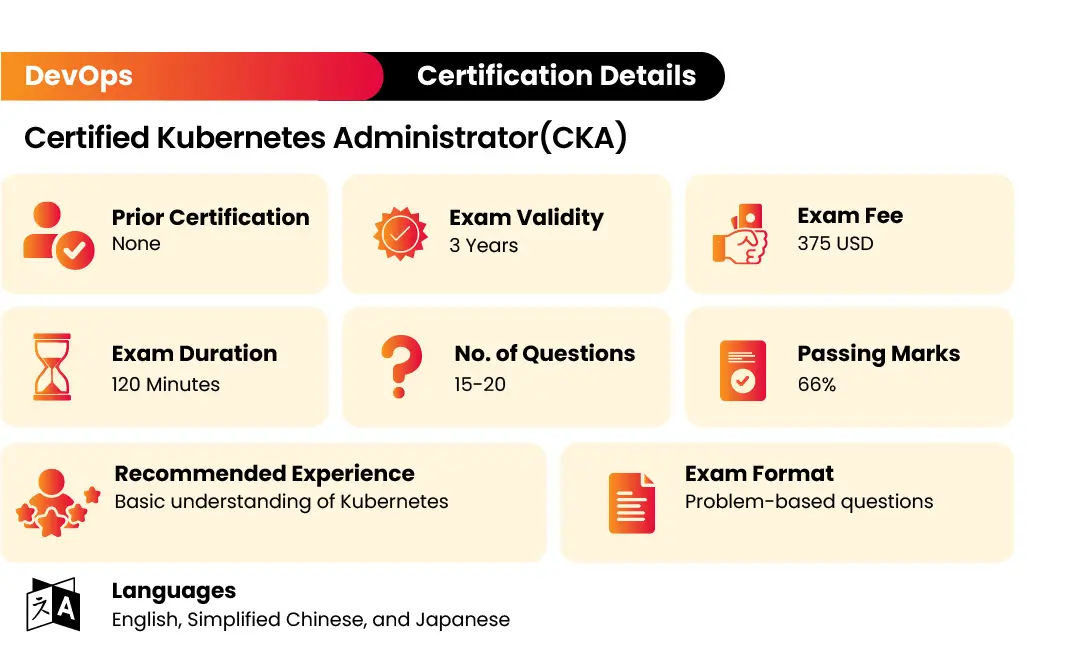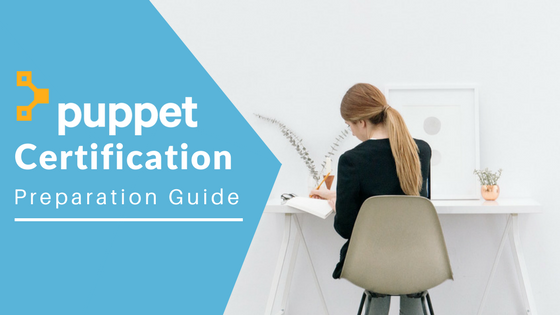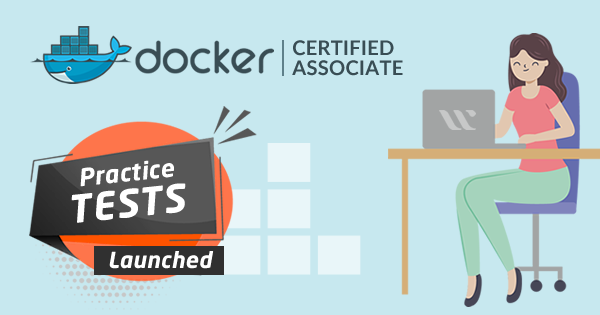The Certified Kubernetes Administrator or CKA exam is one of the prestigious and popular certifications for developers and architects. It validates your knowledge of this container orchestration skills and helps you kickstart your career as a certified Kubernetes administrator.
However, the CKA certification exam is not an easy one to ace if you have never used Kubernetes before. Being an extremely technical and syllabus-heavy certification, you need rigorous practice and proper planning to crack the exam in one go. Additionally, you need to be familiar with numerous technical aspects to be fully prepared for the exam.
This blog captures a few pro tips to help you navigate the exam preparation phase and prevent mess. But before, let’s have a glance at the certification overview.
Time to dive in!
Certified Kubernetes Administrator exam overview
The CKA exam is a role-based certification that provides the skills, knowledge, and competence to perform the daily tasks of a certified Kubernetes administrator.
In other words, this cka certification will validate your container orchestration skills and help you become well-versed with Kubernetes cluster administration methods. As a certified Kubernetes administrator, you will be responsible for:
- Creation and upkeep of a cutting-edge platform to control the Kubernetes cluster’s lifespan
- Design applications to automate, build, test, deploy, and manage platforms
- Assure system availability, health, and service quality and watch systems for incidents.
- System improvements and continuous integration
- Keeping records of activities, setups, and troubleshooting techniques
- Applying patches to applications and systems, as well as responding to user inquiries and support requirements
- Finding and defining standards, norms, and best practices
- Assisting groups in evaluating new specifications, guidelines, and designs.
In addition, Kubernetes is emerging as a high-velocity open-source project. This Cloud Native Computing Foundation (CNCF) certification helps you streamline your job profile for organizations using Kubernetes as a prime component of their operation. Along with this, the CKA exam tests your abilities to perform technical actions like:
- Creating the Kubernetes cluster
- Configuring network and storage on the Kubernetes cluster
- Setting up and securing the Kubernetes cluster
- Controlling and troubleshooting Kubernetes cluster
- Implementing apps to Kubernetes clusters
Also Read: 11 Kubernetes Security best practices you should follow in 2022
Why do you need to upskill in Certified Kubernetes Administrator certification?
Learning Kubernetes is no less than mandatory if you want to kick-start your career in DevOps. The CKA exam is one of the hands-on certifications helping you learn Kubernetes the right way by providing a proper curriculum and learning path, being the perfect stepping stone for your career.
Basically, the size and complexity of projects are growing tremendously in the modern IT industry, making it extremely difficult to manage organizational operations. Kubernetes solves this problem with a breeze. It autonomously scales and manages containers used to deploy and test project or application modules. Moreover, the tool is easy to use, understand, and embed into your current projects.
Also Know: Kubernetes Architecture
Additionally, unlike in monolithic times of IT, where system engineers were responsible for managing virtual machines and virtualization platforms, Kubernetes takes all the burden for handling such sophisticated container platforms. Organizations are migrating from their legacy virtual machines to containers.
As more organizations become early adopters of this transformation, the demand for engineers specializing in Kubernetes will increase by manifolds, as they will be the only professionals with the expertise to manage their modern application platform.
Long story short, all of this means that in the days to come, you can expect a rapid increase in the hiring of Kubernetes experts. Research says a certified Kubernetes administrator can achieve a salary as high as $215,000 annually.
Pro Tips to prepare for the CKA certification exam
To ace the CKA exam, you need a clear mind and strategy up your sleeves. All you require is hands-on with the recommended skills and well-versed with the exam objectives. Or else it may become complete chaos with an overwhelming syllabus.
So to save you some time, here are a few pro tips and tricks. Include them in your strategy to make your preparations super easy. Let’s have a quick glance.
Step 1: Study the CKA exam guide carefully
Download the CKA guide and ensure to get a good hold of exam objectives, requirements, and domains. Skim through their learning paths, instructor-led videos, documentation, resources, etc. Map your preparation requirements with the official documents and resources available and decide what additional materials you require to level up your preparations. The CKA exam consists of five domains:
| Domain | Weightage |
|---|---|
| Cluster Deployment, Architecture, and Configuration | 25% |
| Scheduling and workloads | 15% |
| Networking and service | 20% |
| Storage | 10% |
| Troubleshooting | 30% |
Make sure that you don’t leave any topic or subtopic and focus on every concept. If you haven’t used Kubernetes before, you might find the course trickier and more confusing and would need rigorous practice with the fundamentals. Plan your future phases accordingly.
Step 2: Prepare a detailed calendar
You might find it tedious and stressful to prepare for such a technical course if you are a professional with a full-time job or a student already preparing for a degree. The best way is to prepare a calendar and create a strategy that captures all the headings and subheadings in the syllabus. This way, you won’t skip any concepts and save time for hands-on and practical sessions.
Step 3: Develop a comprehensive view of the CKA exam environment
The CKA course includes various mission-critical and technical concepts. So it becomes vital to get acquainted with the exam environment. That’s why we recommend you use the exact techniques and tools while practicing. Getting comfortable with the Kubernetes techniques will help develop speed and fluency to make the exam frictionless.
While dealing with a nuanced syllabus, you may not have the time to read huge manuals and figure out how to use command-line tools while taking the exam. Try to practice your hands-on skills using the following software:
- Shell-Bash
- Editor-Vim
- Operating system-Ubuntu 18.04
- Browser-Chrome
- Command-line tools- kubectl, tmux, jq
Step 4: Read all the documentation carefully
The best part about the CKA exams is that it allows you to use certain websites and documentation to search terminologies and find answers to your questions. Here are a few sites you are allowed to surf for answers:
Developing a working knowledge of these documents can help you develop agility and speed while appearing for the exam. Additionally, these documents will also help you develop a strong foundation in Kubernetes. Try using only sites when searching for concepts and tools and prepare your answers.
Also, learn how to efficiently leverage the search functions in all the K8 docs and bookmark all the relevant and useful pages.
Step 5: Gain a stronghold of basic Linux Commands
Kubectl will be your main tool for communicating with K8s both during the test and on a daily basis. For the CKA to be successful, kubectl proficiency is essential. You should be able to create, modify, and view objects with it in K8s. Knowing how to configure or fix your present “context” would also be helpful.
Step 6: Start focusing on practical skills
You will spend most of the CKA exam managing K8’s objects and learning about underlying systems in the terminal. Knowledge of the following could therefore be helpful:
- Vi (to edit files in the terminal therefore, Vim use is critical)
- Kubeadm (for upgrading clusters) (for upgrading clusters)
- Journalctl and Systemctl (for controlling services and viewing logs)
- Nslookup (to diagnose DNS issues) (to diagnose DNS issues)
- Curl (to test endpoints) (to test endpoints)
- Tmux (optional but would permit the use of several
Step 7: Focus on gaining practical exposure
To be eligible for the CKA exam, you need in-depth knowledge of Docker containers, JSON, shell scripting, and YAML. The best way is to access GitHub’s hands-on labs and CNCF’s sandbox projects and get a hold of the Kubernetes ecosystem. You can also contribute to their open-source projects and understand the Kubernetes nuances while building a strong portfolio. Some of the hands-on labs for certified Kubernetes administrator cert includes:
- Configuring Web Servers in a Pod using Kubernetes
- Understanding Replication Controller
- Deploying Replication with ReplicaSet Resource
- Mounting Secrets to a Pod as Volumes
- Understanding Service Networking with NodePort
- ClusterIP Service in Kubernetes
- Load Balancer Service Networking in Kubernetes
- Configuring DaemonSet in the cluster
- Persistent Storage in Kubernetes
- Deploying Init containers in a cluster
- Accessing resource as service networking
- Applying Roles based Access Control for Kubernetes
- Controlling Resource Scheduling with Taint and tolerance
Step 8: Attempt practice papers
Attempting practice papers and sample questions is a crucial phase of your preparation strategy. It’s time to apply all the knowledge you have gained so far into practice. You will find innumerable CKA exam question dumps analyzing your prep.
To begin with, you can attempt the official Linux and CKA practice paper. It helps you get a demo experience of the exam and analyze your depth of knowledge. Do a SWOT analysis and detect the weak spots and relearn them.
Step 9: Take one step at a time
Preparing for any exam can feel tiring at times. But whatever the reason, never panic. Take one step at a time. Stick to your calendar, clarify basics, interact with subject-matter experts to gain a better exam perspective, and then keep attempting question dumps. If you need extra motivation, you can reach out to open-source communities focusing on Kubernetes, live events, webinars, etc.
Bonus Tips
- Continue outlining your studies according to the prerequisites list. Make a list of the tasks you can complete in the real world and the skills you still need to be proficient in. Keep in mind that you must be well-versed in Docker containers to be completely prepared to take the CKA exam.
- Don’t forget to check out relevant webinars and discussions. CNCF conducts innumerable online programs, community discussions, events, and many more. These discussions will not only help you network but also learn a lot from the alumni’s experience and enhance your domain expertise.
- Continue to revise the basics of the syllabus. While focusing on complex and technical concepts, simple topics often take a back seat, forcing us to leave even the simplest questions. Treat everything with the same significance and keep skimming through them till the last minute, so you don’t find it hard to recall during the exam.
FAQs
What is the validity of the CKA exam?
The CKA exam: Certified Kubernetes Administrator exam is valid for three years.
How many questions are there in the CKA certification exam, and what is the pattern?
The CKA exam has 15-20 questions in the form of problem-based questions.
What are the passing marks?
The passing marks for the CKA exam are 66%.
How much does the CKA exam cost?
The exam costs $375 USD.
What are the prerequisites for the CKA certification exam?
To be eligible for the CKA certification, you need to be hands-on with:
- JASON and YAML
- Docker containers
- Shell scripting
- Linux administration
- DevOps methodologies
Summary
Hope this blog helps you prepare an efficient preparation strategy. The success of any preparation lies in the relevance of the resources. With this in mind, Whizlabs offers updated and relevant materials to take your certified Kubernetes administrator exam to the next level. You will find numerous practice resources, video lectures curated by industry leaders, and CKA hands-on labs to gain the recommended skills.
Want to know more about our training programs? Or find out which certifications match your profile. Or, want to know how you can get your team upskilled in Kubernetes? Contact us at support@whizlabs.com!
- Top 25 DevSecOps Interview Question and Answers for 2024 - March 1, 2023
- How to prepare for VMware Certified Technical Associate [VCTA-DCV] Certification? - February 14, 2023
- Top 20 Cloud Influencers in 2024 - January 31, 2023
- 25 Free Question on SC-100: Microsoft Cybersecurity Architect - January 27, 2023
- Preparation Guide on MS-101: Microsoft 365 Mobility and Security - December 26, 2022
- Exam tips to prepare for Certified Kubernetes Administrator: CKA Exam - November 24, 2022
- Top Hands-On Labs To Prepare For AWS Certified Cloud Practitioner Certification - October 27, 2022
- Why do you need to upskill your teams with the Azure AI fundamentals? - October 11, 2022



